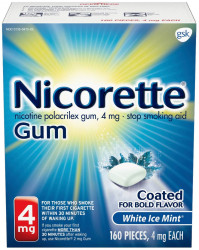Nicorette Gum (nicotine gum) Coupons, Discounts & Cost
Nicorette is a gum for the treatment of nicotine addiction. One way to save money on the Nicorette Gum retail cost regardless of income and insurance status is to use Nicorette Gum coupons or discount cards from RXCoupons. Use this Nicotine Gum coupon at this online pharmacy and receive up to 75% off the sale price.
Nicorette gum drug information
Nicorette is a gum for the treatment of nicotine addiction. This is a drug that reduces the craving for smoking and helps you give up smoking. The drug suppresses withdrawal symptoms caused by quitting smoking. Such withdrawal symptoms may include: dysphoria, insomnia, irritability, anxiety, decreased heart rate, increased appetite or weight gain.
Nicorette therapy reduces the severity of withdrawal symptoms that occur with those who have decided to quit smoking. The drug also helps reduce the number of cigarettes smoked by those who cannot give up smoking completely.
Nicorette indications:
- Treatment of nicotine dependence;
- Reduction in withdrawal symptoms in patients who have decided to quit smoking;
- Reduction in withdrawal symptoms in temporary smoking cessation;
- Reduction in the number of cigarettes smoked by those who cannot give up smoking completely.
Do NOT use Nicorette gum in the following cases
Nicorette gum should not be used in the presence of the following diseases and conditions:
- Hypersensitivity to nicotine or other components of the gum.
Nicorette gum can be used by patients with disorders of the cardiovascular system (in particular, serious heart disease such as stroke, unstable angina, arrhythmia, myocardial infarction, bypass surgery) or uncontrolled hypertension only after consultation with a doctor.
The gum should be used with caution in patients with moderate or severe hepatic impairment, severe renal insufficiency, duodenal ulcer and stomach ulcer.
Nicorette gum should be used with caution in patients with uncontrolled hyperthyroidism, pheochromocytoma, and diabetes.
Pregnancy and lactation
There is always a risk to the fetus or child when you speak of nicotine. Therefore, pregnant women should try to avoid nicotine replacement therapy.
Nicotine is present in the breast milk even when taken in therapeutic doses. Therefore, Nicorette gum should not be used during lactation in order to reduce the negative effects of nicotine on the child.
Nicorette gum instructions for use
As a rule, Nicorette gum (2 mg) should be used if you smoke less than 20 cigarettes a day. Nicorette gum (4 mg) should be used if you smoke more than 20 cigarettes a day.
The gum should be used where there is an irresistible urge to smoke. Follow the recommended scheme:
- Chew the gum slowly.
- Stop chewing for a while and leave the gum near the inner side of the cheek.
- Start chewing the gum again.
- Chew only one piece as a single dose.
The daily dose is determined by the degree of nicotine dependence, but is usually 8-12 pieces per day. The daily dose should not exceed 15 pieces a day. Use this chewing gum up to 3 months. After that, the daily number of pieces should be gradually reduced. The therapy should be stopped when the daily dose is 1-2 pieces per day.
It is not recommended to use Nicorette gum for more than 12 months. However, long-term therapy may be more effective in some patients.
Nicorette gum should be used to lengthen the intervals between smoking episodes (to minimize the number of cigarettes). Patients should seek professional help if there is no improvement within 6 weeks.
Nicorette gum can be used when it is necessary to refrain from smoking (for example, in places where smoking is prohibited).
The gum can be used only on doctor's advice in patients under 18 years of age.
Possible side effects of Nicorette gum
The recommended dosage regimen will lead to no serious adverse effects. Nicotine may sometimes cause a slight irritation of the throat and increased salivation. Excessive amounts of nicotine may cause hiccups, nausea, weakness or headache
Digestive system: dyspepsia, hiccups, nausea, vomiting.
Cardiovascular system: tachycardia, atrial fibrillation.
General disorders: pain in the muscles of mastication, allergic reactions up to angioedema (very rarely).

